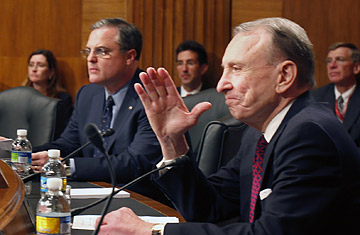
Senator Arlen Specter of Pennsylvania sits on the Democratic side of the dais during an appropriations hearing at the Capitol on April 28
(2 of 2)
Senator Ben Nelson of Nebraska, the most conservative Democrat in the caucus, admitted that the switch does not mean an automatic 60 Democrats on every vote. "The switch shows just how diverse a caucus we are," Nelson said, adding that his only surprise was that Specter's growing doubts took so long to percolate. "We worked closely together on the stimulus, and I saw it then."
While acknowledging that his party has to broaden its appeal, Senator Lindsey Graham, a South Carolina Republican, claimed that the Dems' potential 60-vote majority could actually make recruitment easier for the GOP. "They'll say we may be the only thing between them and a radical agenda," Graham said. The switch "puts a lot of pressure on Red State Democrats, who campaigned on a platform of bipartisanship. I hope they will live up to the rhetoric and join us when things get radical."
Specter's move comes after a career of sometimes-high-profile maverick stands. He cast a pivotal vote against the confirmation of Judge Robert Bork for the Supreme Court, he voted "not proven, therefore not guilty" on the impeachment of Bill Clinton, and he was a rare pro-choice Republican. A sometimes abrasive but highly effective Senator, he has consistently secured valuable projects for Pennsylvania, protecting shipyards and funding university research. His latest move to dodge political death mirrors his surviving multiple battles with life-threatening disease (including brain cancer and lymphoma as well as open-heart surgery).
Several Republicans greeted the news with dismay. "I think this is about Senator Specter's sense of political preservation," said Senator John Cornyn of Texas. "It's a purely personal decision." Added Senator John McCain: "I regret it."
